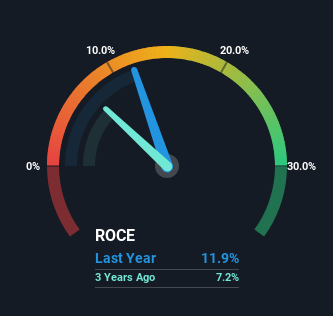- United States
- /
- Chemicals
- /
- NYSE:LYB
Some Investors May Be Worried About LyondellBasell Industries' (NYSE:LYB) Returns On Capital

If we want to find a stock that could multiply over the long term, what are the underlying trends we should look for? One common approach is to try and find a company with returns on capital employed (ROCE) that are increasing, in conjunction with a growing amount of capital employed. Basically this means that a company has profitable initiatives that it can continue to reinvest in, which is a trait of a compounding machine. However, after investigating LyondellBasell Industries (NYSE:LYB), we don't think it's current trends fit the mold of a multi-bagger.
Return On Capital Employed (ROCE): What Is It?
Just to clarify if you're unsure, ROCE is a metric for evaluating how much pre-tax income (in percentage terms) a company earns on the capital invested in its business. Analysts use this formula to calculate it for LyondellBasell Industries:
Return on Capital Employed = Earnings Before Interest and Tax (EBIT) ÷ (Total Assets - Current Liabilities)
0.12 = US$3.5b ÷ (US$37b - US$7.2b) (Based on the trailing twelve months to December 2023).
Therefore, LyondellBasell Industries has an ROCE of 12%. On its own, that's a standard return, however it's much better than the 9.9% generated by the Chemicals industry.
View our latest analysis for LyondellBasell Industries

Above you can see how the current ROCE for LyondellBasell Industries compares to its prior returns on capital, but there's only so much you can tell from the past. If you'd like, you can check out the forecasts from the analysts covering LyondellBasell Industries for free.
What The Trend Of ROCE Can Tell Us
In terms of LyondellBasell Industries' historical ROCE movements, the trend isn't fantastic. To be more specific, ROCE has fallen from 23% over the last five years. Given the business is employing more capital while revenue has slipped, this is a bit concerning. This could mean that the business is losing its competitive advantage or market share, because while more money is being put into ventures, it's actually producing a lower return - "less bang for their buck" per se.
The Bottom Line On LyondellBasell Industries' ROCE
In summary, we're somewhat concerned by LyondellBasell Industries' diminishing returns on increasing amounts of capital. Yet despite these concerning fundamentals, the stock has performed strongly with a 53% return over the last five years, so investors appear very optimistic. Regardless, we don't feel too comfortable with the fundamentals so we'd be steering clear of this stock for now.
LyondellBasell Industries does have some risks though, and we've spotted 3 warning signs for LyondellBasell Industries that you might be interested in.
While LyondellBasell Industries may not currently earn the highest returns, we've compiled a list of companies that currently earn more than 25% return on equity. Check out this free list here.
New: AI Stock Screener & Alerts
Our new AI Stock Screener scans the market every day to uncover opportunities.
• Dividend Powerhouses (3%+ Yield)
• Undervalued Small Caps with Insider Buying
• High growth Tech and AI Companies
Or build your own from over 50 metrics.
Have feedback on this article? Concerned about the content? Get in touch with us directly. Alternatively, email editorial-team (at) simplywallst.com.
This article by Simply Wall St is general in nature. We provide commentary based on historical data and analyst forecasts only using an unbiased methodology and our articles are not intended to be financial advice. It does not constitute a recommendation to buy or sell any stock, and does not take account of your objectives, or your financial situation. We aim to bring you long-term focused analysis driven by fundamental data. Note that our analysis may not factor in the latest price-sensitive company announcements or qualitative material. Simply Wall St has no position in any stocks mentioned.
About NYSE:LYB
LyondellBasell Industries
Operates as a chemical company in the United States, Germany, Mexico, Italy, Poland, France, Japan, China, the Netherlands, and internationally.
Undervalued with adequate balance sheet and pays a dividend.
Similar Companies
Market Insights
Community Narratives




